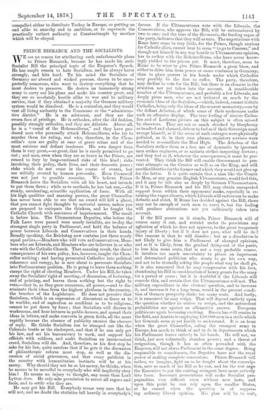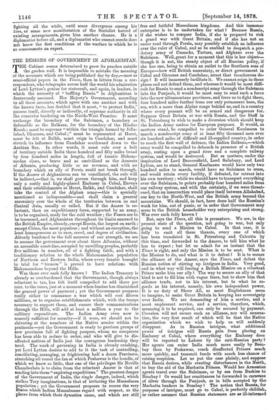PRINCE BISMARCK AND THE SOCIALISTS.
WE see no reason for attributing such unfathomable plans to Prince Bismarck, because he has made his anti- Socialist Bill the principal topic of the Emperor's Speech. He has ample reason to hate Socialism, and he always hates strongly, and hits hard. To his mind the Socialists of Germany are absurd and wicked persons, shown to be unex- pectedly numerous, who want to destroy everything that he most desires to preserve. He desires an immensely strong army to carry out his plans and make his country great, and they are so resolutely hostile alike to war and to military service, that if they obtained a majority the German military system would be dissolved. He is a centralist, and they would vest all living authority in the Commune or the "administra- tive district." He is an aristocrat, and they are the sworn foes of privilege. He is orthodox, after the old fashion, possibly strongly orthodox, and they are Atheists. Above all, he is a "vassal of the Hohenzollerns," and they have pro- -duced men who personally attack Hohenzollerns, who try to murder them for ruling, and who, therefore, in the Chan- cellor's eyes are guilty at once of grave crime and of the most extreme and defiant insolence. His own danger from them is very great,—so great, that he is rarely permitted to go out; and men, even when they are as brave as the Prince, are roused to fury by long-continued risks of this kind ; risks involving their policy, their lives, and their domestic peace ; risks which do not come in the course of events, but are wilfully created by human perversity. Even Cromwell was not just to possible assassins. We believe Prince Bismarck hates the Socialists with all his heart, and intends to put them down ; while as to methods, he has but one,—the steady, unrelenting, scientific application of force. With all his high qualities and amazing powers, the great Chancellor has never been able to see that no sword will kill a ghost, that you cannot fight thoughts by material means, unless you are prepared to extirpate the thinkers, and he fought the Catholic Church with sentences of imprisonment. The result is before him. The Ultramontane Deputies, who before the Falk Laws were passed were nearly invisible, are to-day the strongest single party in Parliament, and hold the balance of power between Liberals and Conservatives in their hands. Broadly speaking, the Reichstag now contains just three nearly equal parties,—Members who will vote as Conservatives, Mem- bers who are Liberals, and Members who are believers in or who vote with the Catholic Church. That amazing result, the direct consequences of his own policy, has, however, taught the Chan- cellor nothing ; and having persecuted Catholics into political -coherence and energy, he is now about to persecute Socialists into Parliamentary position. He is going to leave them nothing except the right of electing Members. Under his Bill, he takes -away the Socialists' right of meeting, of discussion, of lecturing, and of printing, and leaves them nothing but the right to vote,—that is, as they grow numerous, all power,—and to dis- seminate their ideas from the highest platform in the country, the benches of the Legislature. He does not perceive that Socialism, which is an expression of discontent so fierce as to be warlike, and of aspiration so confident as to be religious, -cannot be put down by force ; that Socialists will discuss in workrooms, and hear lectures in public-houses, and spread their ideas in letters, and make converts in green fields, all the more rapidly because the absence of publicity ensures the absence cf reply. He thinks Socialism can be stamped out like the Colorado beetle or the rinderpest, and that if he can only get his law, and set his bureaucracy to work, and support his officials with soldiers, and make Socialism an inconvenient creed, Socialism will die. And, therefore, as his first step he asks for his law, quite careless that if he gets it the discussion of philanthropic reform must stop, as well as the dis- cussion of social grievances, and that every publicist in the country with humanitarian instincts will be at his mercy. Why should they not be at his mercy, he thinks, when he means to be merciful to everybody who will implicitly obey him He means no injury to thought, any more than Lord Lytton does. He only asks permission to arrest all rogues and fools, and to settle who they are.
He may get his Bill. Everybody seems very sure that he will not, and no doubt the statistics tell heavily in everybody's favour. If the Ultramontanes vote with the Liberals, the Conservatives, who approve the Bill, will be outnumbered by
two to one; and the tone of the Germania, the leading organ of the party, indicates that they will so vote. The negotiations with
Rome have come to very little, for the Prince, though anxious for Catholic allies, cannot bear to seem "to go to Canossa," and though not himself in any way hostile to Ultramontane opinion, has to reckon with the Hohenzollerns, who have never know- ingly yielded to the priests yet. It must, therefore, seem to Rome to be wiser to give Prince Bismarck a great blow, and either to drive him from power or cause confusion in Germany, than to place powers in his hands under which Catholics may possibly be the first to suffer. The party, therefore,
may decline to vote for the Bill ; but there is an element in the situation not yet taken into the account. A considerable
number of the Ultramontanes, and probably a few Liberals, are deeply pious men, who are not irritated so much by the economic ideas of the Socialists,—which, indeed, cannot irritate Catholics, being only the ideas of the nearest monastery,—as by the defiant Atheism, of which some of their spokesmen make such an offensive display. The true feeling of sincere Catho- lics and of Lutheran pietists on this subject is often missed by observers. They are not so much shocked by blasphemy as insulted and alarmed, driven to feel as if their Sovereign must
avenge himself, as if the scene of such outrages were physically polluted, as if, in their own phrase, expiatory services were
needed to re-conciliate the Most High. The Atheism of the Socialists strikes them as a free use of dynamite by ignorant men strikes engineers, or as malaria strikes inspecting doctors ; and they feel as if, whatever the consequences, it must be pre- vented. They think the Bill will enable Government to pre- vent attempts on the Creator as well as on the King, and will sacrifice liberties for the former end which they would not give up for the latter. It is quite certain that a man like the Comte de Mun, or any genuine English Ultramontane, would feel this, and it may be felt also as deeply by German Ultramontanes.
If it is, Prince Bismarck and his Bill may obtain unexpected support from within their opponents' ranks, especially in re- taining the vague clauses, which Liberals will endeavour to make definite and strict. If Rome has decided against the Bill, there may not be enough of such men to carry it, but the feeling will produce abstentions not yet sufficiently taken into account.
If the Bill passes as it stands, Prince Bismarck will of
course carry it out, and restrict under its provisions any agitation of which he does not approve, to the great temporary injury of liberty ; but if it does not pass, what will he do ? One rumour is that he will dissolve ; but as a dissolution is not likely to give him a Parliament of changed opinions, and as it is likely, from the gradual dying-out of the panic, to lose him some seats, that is not a very probable course. It involves too much uncertainty to please an impetuous and determined politician who wants to go his own way, and not to be eternally asking the people what way he shall go. It is also rumoured that he may compromise with his foes, abandoning his Bill in consideration of heavy grants for the army for a period of years ; but it is doubtful if the Liberals will concede this, and certain that the Ultramontanes will not. The military expenditure is the electors' question, and to increase it, and increase it for a long term, would in the present condi- tion of German prosperity shake too many seats. And lastly,
it is rumoured he may resign. That will depend entirely upon the question whether he wishes to resign, and the antecedent probabilities are against an affirmative answer. European politics are again becoming exciting. Russia has st ill armies in the field, and Austria is employing 150,000 men in a strife which her Generals seem as yet hardly to understand. It is an hour when the great Chancellor, ruling the strongest army in Europe, has much to think of and to do in departments which his Parliament leaves entirely in his hands. lie will not, we think, just now voluntarily abandon power ; and a threat of resignation, though it has so often prevailed with the Emperor, will not alarm Parliament in the same degree. Being responsible to constituents, the Deputies have not the royal power of making complete concessions. Prince Bismarck will rather, we imagine, fight on as be fought about the conscrip- tion, save as much of his Bill as he can, and for the rest urge the Executive to put the existing stringent laws more actively into force. Incessant prosecutions will make Socialist pro- pagandism very difficult even without new laws, and upon this point he can rely upon the smaller States, as he cannot when the question is of suppres-
ing ordinary liberal opinion. His plan will be to wait, fighting all the while, until some divergence among his foes, or some new manifestation of the Socialist hatred of existing arrangements, gives him another chance. He is a diplomatist before all, and a diplomatist who cannot recede does not know the first conditions of the warfare in which he is so consummate an expert.































 Previous page
Previous page